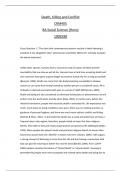Death, Killing and Conflict
CRM405
BA Social Science (Hons)
1905590
Essay Question 1: “The claim that contemporary western society is death-denying is
simplistic if not altogether false” (Zimmerman and Rodin 2010:127). Critically evaluate
the above statement.
Unlike other species, humans have a conscience and are aware of death and the
inevitability that one day we will all die. Humans have a hard time accepting death and
over centuries have gone to great length to preserve human life for as long as possible
(Bauman, 1992). Death can come from the body becoming susceptible to disease,
cancers or can come from being harmed by another person or accidental cause. All in
all death is relatively associated with pain or a sense of relief (Williamson, 2003).
Death and dying are also considered as extremely lonely place or phenomenon; we are
all born into the world alone and die alone (Elias, 2001). In earlier years, before the
industrial revolution, people were faced by death in everyday life. Life expectancy was
much, much lower as living conditions were poor, there was no medical practices or
guidance of personal hygiene, and there was much more upfront conflict and killing
(Stanley & Wise , 2011). In premodernity death was a social and public fact and was a
frequent day to day regime, therefore, people relied on hope that their religious
beliefs, their faith in God and rituals would protect and preserve life (Shilling & Mellor,
1993). Many people also played rituals and practiced religious beliefs to ensure their
loved ones would reach the ‘afterlife’ in which ever form (Davies, 2005). Faith argues
a strong concept of believing in more than this life and that having a connection with
God can give life meaning or better the next life lived (Bendle, 2009). Arie’s (1974-
1981) explains societies formation of ‘Tamed Death’ or ‘natural death’ meaning in
premodernity people were more acceptant and relaxed about death and dying due to
, common practice in religious beliefs (Shilling & Mellor, 1993). Although, an important
ideal to understand here is that many religious or spiritual beliefs commonly subside
the biological truth, that death means the end of life and therefore raises a sense of
denial or non-acceptance of this abrupt end (Shilling & Mellor, 1993). In contemporary
western society this comparison can be captured as societies denial or acceptance of
death. Throughout this essay I will evaluate Zimmerman and Rodin’s claim that
contemporary western societies denial of death is simplistic if not altogether false. I
will do this by exploring sociological ideologies and theory of how contemporary
western society has developed a complex and individualised concept of death and how
death can coherently be both denied or accepted by individuals in modernity. Firstly, I
will outline the history of how people have dealt with death and secondly, I will
critique the statement by Zimmerman and Rodin by highlighting the sociological
evidence of how contemporary western society has developed and now recognised as
a death-denying or death accepting culture. I intend on achieving this by examining
academic texts and covering relevant theory.
During the 16th century and onwards, carcasses were used to practice and learn from
for medical science. An anatomical scientist, William Harvey, referred the human body
to a ‘machine’ when discovering the work of the heart and how the blood pumped
round the body. This scientific discovery initiated the idea that people could be fixed
or saved from death by a medical profession (BBC History, 2014). With that came
centuries of academic achievement, exploration of modern medicines, machinery, and
scientific theory but it was never quite enough evidence to shelf the ‘afterlife’
phenomenon, an important and significant part of many religious beliefs that built a
framework of togetherness and community in life up till death (Shilling & Mellor,
1993). Industrialisation furthered the exploration and development of science and
technology but was impeded by the overpopulated cities increasing rates of disease,
over-crowding, bad hygiene, malnutrition, and poverty. People now (under the 1879
Education Act) are receiving an education to work for private owners in large factories
and workhouses. There were still significant death rates happening at a younger age
than in modern society. However, industrialisation revolutionised values regarding life
and death. Religion was no longer a large part in preventing or preserving death but




